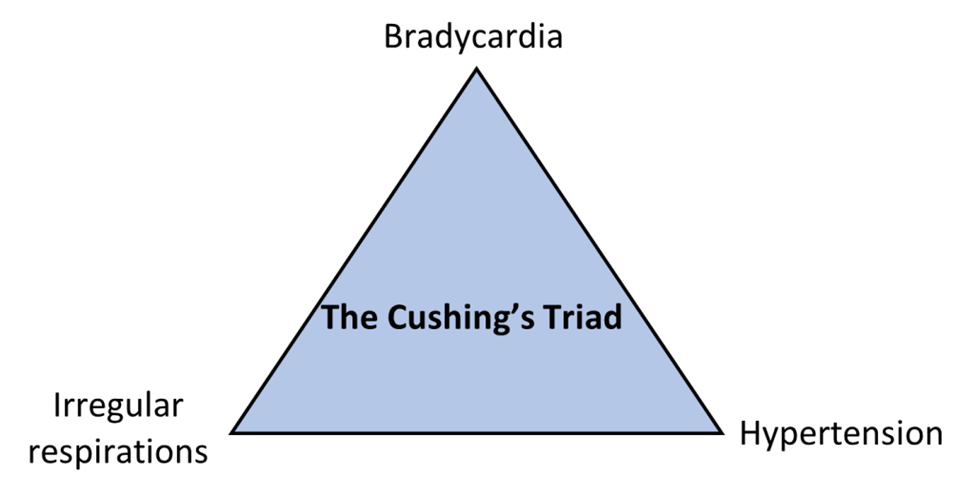Which three symptoms are characteristic of Cushing triad associated with increased ICP?
Bradycardia, hypertension, and widening pulse pressure
Widening pulse pressure, headache, and seizure
Hypertension, tachycardia, and headache
Hypotension, tachycardia, and narrowing pulse pressure
The Correct Answer is A
A. Bradycardia, hypertension, and widening pulse pressure
This combination of symptoms is characteristic of Cushing's triad. Bradycardia (slow heart rate), hypertension (elevated blood pressure), and widening pulse pressure (difference between systolic and diastolic blood pressure) are indicative of increased ICP, specifically resulting in the compression of brain structures that regulate vital functions.
B. Widening pulse pressure, headache, and seizure
While headache and seizure may occur in patients with increased ICP, widening pulse pressure alone is not sufficient to meet the criteria of Cushing's triad. The presence of bradycardia and hypertension, along with widening pulse pressure, is more indicative of Cushing's triad.
C. Hypertension, tachycardia, and headache
Hypertension and headache may occur in patients with increased ICP, but the absence of bradycardia and widening pulse pressure makes this option less characteristic of Cushing's triad.
D. Hypotension, tachycardia, and narrowing pulse pressure
Hypotension (low blood pressure) and narrowing pulse pressure are not typically associated with Cushing's triad. Tachycardia (rapid heart rate) may occur in response to increased ICP, but it is usually accompanied by bradycardia rather than hypotension.

Nursing Test Bank
Naxlex Comprehensive Predictor Exams
Related Questions
Correct Answer is A
Explanation
A.Computerized tomography angiography (CTA)
This is a likely diagnostic test that the provider may prescribe. CTA uses computed tomography (CT) imaging to visualize the blood vessels in the brain and neck. It can help identify areas of stenosis, occlusion, or other abnormalities in the blood vessels that may contribute to the TIA symptoms.
B. Complete blood count (CBC)
A complete blood count (CBC) is a routine laboratory test that assesses various components of blood, such as red blood cells, white blood cells, and platelets. While it may not be specific to diagnosing a transient ischemic attack (TIA), it can help evaluate for underlying conditions such as anemia or thrombocytosis that could contribute to TIA symptoms or increase the risk of stroke.
C. Prothrombin time (PT)
Prothrombin time (PT) is a laboratory test that evaluates the clotting ability of blood and is typically used to monitor anticoagulant therapy. While abnormal coagulation parameters may be associated with certain conditions that predispose to TIA (such as atrial fibrillation), PT alone is not a specific diagnostic test for TIA.
D. Transesophageal echocardiogram (TEE)
This is another possible diagnostic test that the provider may prescribe. TEE is a specialized echocardiogram that provides detailed images of the heart structures by inserting an ultrasound probe
Correct Answer is A
Explanation
A. The client should maintain systolic BP between 120 and 129 mm Hg.
This is an appropriate recommendation. The American Heart Association (AHA) guidelines recommend maintaining systolic BP below 130 mm Hg to reduce the risk of stroke and other cardiovascular events in individuals with a history of stroke or TIA.
B. The client should maintain systolic BP between 130 and 135 mm Hg.
This is slightly above the recommended range. While systolic BP below 135 mm Hg is generally recommended for individuals with a history of stroke or TIA, a range of 130-135 mm Hg may still be acceptable based on individual patient factors and risk assessments.
C. The client should maintain systolic BP between 136 and 140 mm Hg.
This is above the recommended range. Systolic BP between 136 and 140 mm Hg may be considered elevated and should be managed to lower levels to reduce the risk of recurrent TIA or stroke.
D. The client should maintain systolic BP between 141 and 145 mm Hg.
This is above the recommended range. Systolic BP above 140 mm Hg is generally considered elevated and should be managed to lower levels to reduce the risk of recurrent TIA or stroke.
Whether you are a student looking to ace your exams or a practicing nurse seeking to enhance your expertise , our nursing education contents will empower you with the confidence and competence to make a difference in the lives of patients and become a respected leader in the healthcare field.
Visit Naxlex, invest in your future and unlock endless possibilities with our unparalleled nursing education contents today
Report Wrong Answer on the Current Question
Do you disagree with the answer? If yes, what is your expected answer? Explain.
Kindly be descriptive with the issue you are facing.
